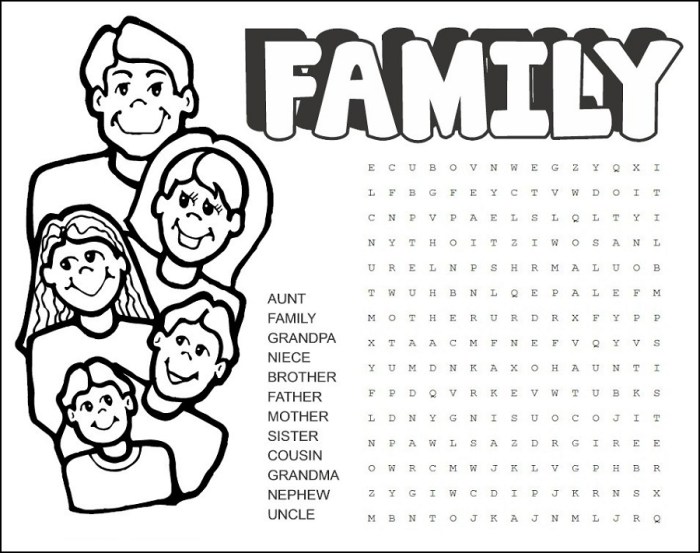Embark on a captivating journey into the realm of family history with La Familia Search a Word Answer Key, an indispensable guide to unearthing the secrets of your lineage. As we delve into the intricate tapestry of family research, this comprehensive resource empowers you with the tools and techniques to uncover the forgotten stories of your ancestors, unraveling the mysteries of your past.
Key Terms and Concepts

In the context of the search query, “la familia” refers to the Spanish word for “family.” It encompasses individuals related by blood, marriage, or adoption, forming a social unit with shared values, customs, and history.
Related terms include “family,” which denotes a group of people related by blood or marriage; “relatives,” referring to individuals connected through kinship or descent; and “genealogy,” the study of family lineage and ancestry.
The term “search” holds significance in family research, as it represents the process of uncovering and exploring information about one’s family history. This may involve accessing records, conducting interviews, and utilizing online resources to trace ancestral connections and uncover familial origins.
Importance of Family Search
Family search plays a crucial role in fostering a sense of identity, belonging, and continuity. By delving into their family history, individuals can gain a deeper understanding of their roots, cultural heritage, and the experiences that have shaped their ancestors and ultimately themselves.
Furthermore, family research contributes to the preservation of cultural and historical knowledge. It allows individuals to document and share their family’s unique story, contributing to the collective memory of communities and nations.
Search Strategies and Resources

Effective family research requires strategic approaches and reliable resources. This section provides guidance on developing effective search strategies and identifying valuable resources for locating information about family members.
Online Resources
The internet offers a wealth of online resources for family history research. Search engines, such as Google, Bing, and Yahoo, can be used to locate websites, databases, and social media platforms that contain genealogical information.
- Genealogy Websites:Ancestry.com, FamilySearch.org, and MyHeritage.com are dedicated genealogy websites that provide access to extensive databases of birth, marriage, and death records, census data, and family trees.
- Databases:The National Archives and Records Administration (NARA) and the Library of Congress provide access to historical documents and records, including military records, immigration records, and land grants.
- Social Media Platforms:Facebook, Twitter, and Instagram can be used to connect with distant relatives and share family history information.
Offline Resources
While online resources are valuable, offline resources also play a crucial role in family research. These resources include:
- Local Libraries:Public libraries often have genealogy sections with access to books, microfilms, and other resources related to family history.
- Historical Societies:Local and regional historical societies preserve and maintain records and documents that can provide valuable insights into family history.
- Cemeteries:Gravestones and cemetery records can provide information about birth and death dates, family relationships, and migration patterns.
Interpreting and Organizing Search Results: La Familia Search A Word Answer Key
Interpreting search results involves evaluating the relevance and credibility of the information found. Identifying relevant information requires an understanding of the research question and the ability to distinguish between useful and irrelevant data. Credibility assessment considers factors such as the source’s authority, publication date, and alignment with established knowledge.
Organizing and Managing Family Research Data
Organizing family research data is crucial for effective analysis and presentation. Techniques include:
- Note-taking and citation management: Accurate record-keeping and proper citation ensure traceability and avoid plagiarism.
- Data entry and spreadsheets: Digital tools facilitate data organization, sorting, and analysis.
- Genealogical software: Specialized programs assist in managing family trees, tracking relationships, and generating reports.
Creating Family Trees, Timelines, and Other Visual Representations
Visual representations enhance family history comprehension. Techniques include:
- Family trees: Diagrams depicting familial relationships, ancestors, and descendants.
- Timelines: Chronological representations of significant events and milestones in family history.
- Maps: Visualizations of geographical connections and migration patterns within a family.
These representations aid in identifying patterns, connections, and gaps in family history, providing a comprehensive understanding of the family’s past.
Using HTML Tables for Family Data

HTML tables offer a structured and visually appealing way to present family data. They enable the organization of information into rows and columns, making it easy to read and understand.
Creating an HTML Table
To create an HTML table, use the
| tag. For example:
“`html
“` Formatting and StylingTo format and style the table, use HTML attributes. For instance, the width of a column can be set using the width attribute, and the background color of a cell can be set using the bgcolor attribute. Additionally, CSS can be used to enhance the appearance of the table. Benefits of Using TablesTables provide several benefits for organizing and presenting family history information:
Additional ConsiderationsEngaging in family research involves navigating ethical implications and seeking appropriate resources for support. Understanding these considerations ensures responsible and respectful practices while pursuing family history. Ethical ImplicationsFamily research often involves accessing personal information and sensitive family records. Respecting privacy is paramount, and researchers should adhere to ethical guidelines to protect individuals’ rights. Informed consent should be obtained before using or sharing any personal data, and researchers must maintain confidentiality throughout the process. Resources for Further Research and SupportNumerous resources are available to assist individuals in their family research endeavors. Online databases, libraries, and historical societies provide access to vast collections of records and documents. Additionally, support groups and genealogy societies offer valuable networking opportunities and expertise sharing. Impact of Family Research, La familia search a word answer keyFamily research has profound impacts on individuals and communities. Uncovering family history can foster a sense of identity, connection, and belonging. It can also shed light on cultural heritage, social dynamics, and historical events. Sharing family stories and experiences can strengthen family bonds and contribute to a collective understanding of the past. FAQ CornerWhat is the significance of “search” in the context of family research? In family research, “search” plays a pivotal role in uncovering information about family members. It involves employing effective search strategies, utilizing reliable resources, and leveraging the power of search engines, databases, and social media platforms to locate and identify relevant data. How can HTML tables be beneficial for organizing family history information? HTML tables provide a structured and organized way to display family data, making it easy to visualize and analyze relationships. They allow for the efficient presentation of information such as names, birth dates, and relationships, enabling researchers to quickly identify patterns and connections within their family history. What ethical considerations should be taken into account when conducting family research? Family research involves handling sensitive personal information, so it is crucial to adhere to ethical guidelines. These include respecting privacy concerns, obtaining informed consent when necessary, and ensuring the responsible use of data. Researchers should prioritize the protection of individuals’ rights and maintain confidentiality throughout the research process. |